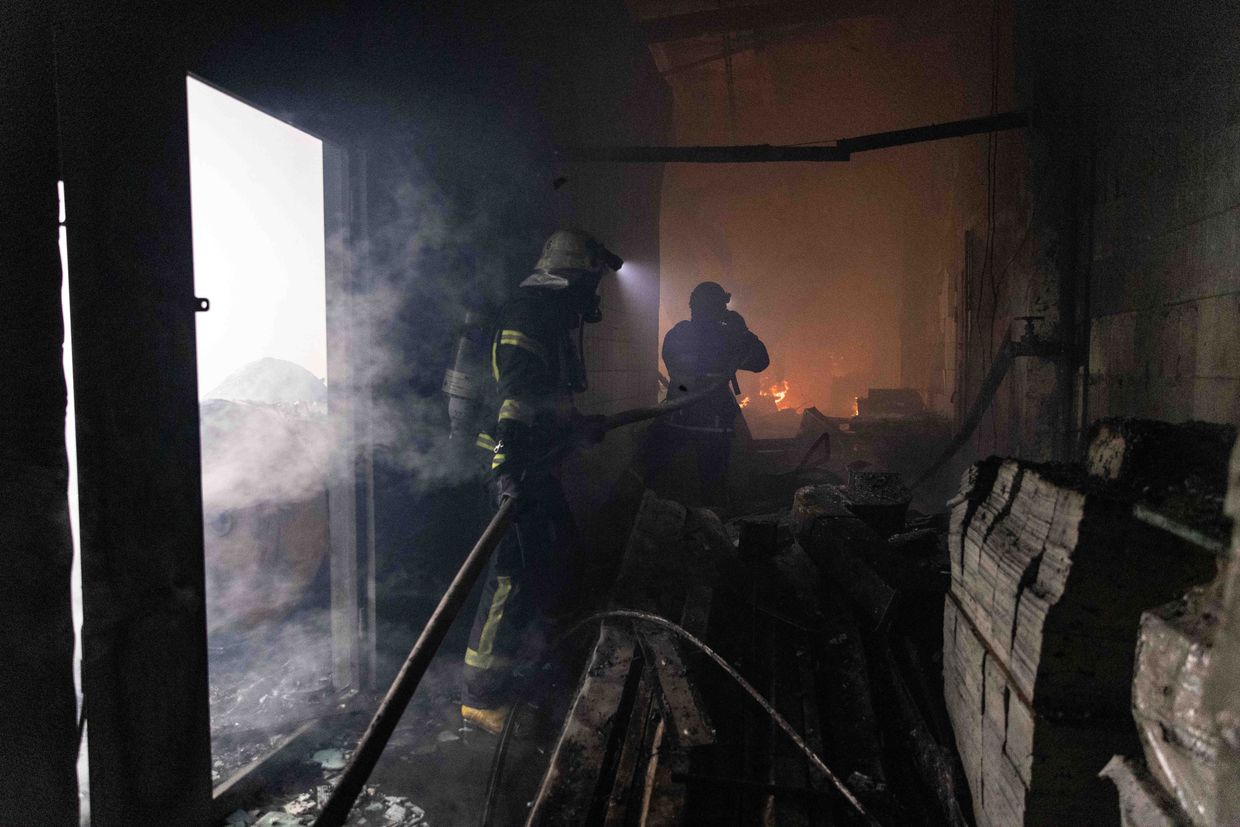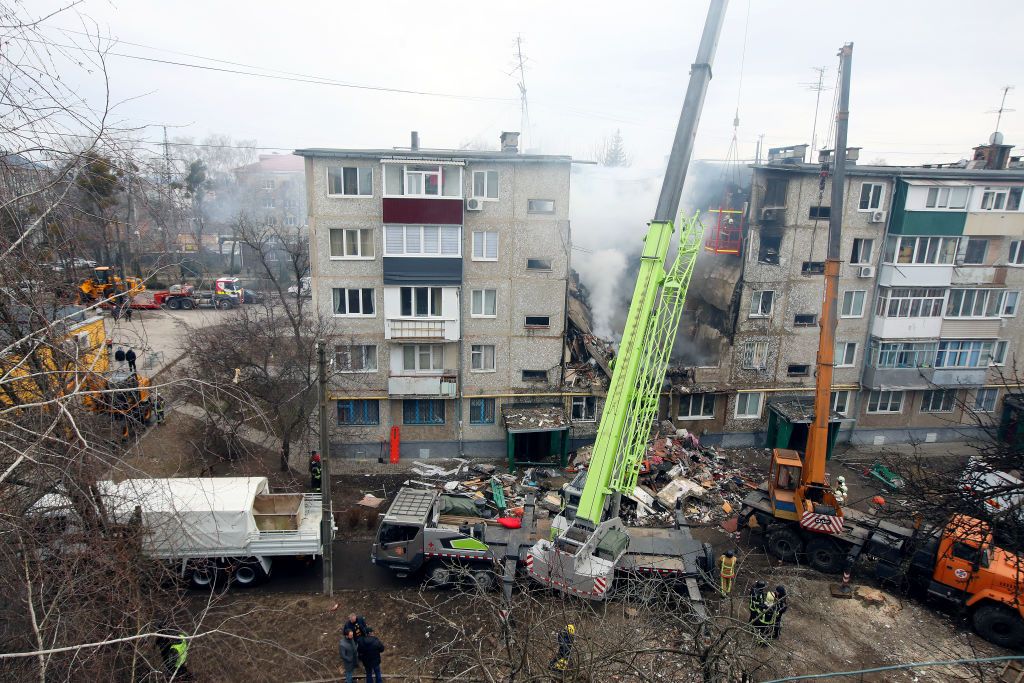Ukraine war latest: Russia attacks civilians in Kharkiv; Zelensky inspects fortifications

Key developments on March 27:
- Russian attack on Kharkiv residential area kills 1, injures at least 19, including children
- At least 8 people injured in Russian attack on Mykolaiv
- Zelensky visits northern Sumy Oblast, inspects fortifications
- Parliamentary committee blocks bill that would allow demobilization after 36 months of service without command's approval
- Poland doubles its contribution to Czech ammunition initiative for Kyiv
Russian attack on Kharkiv residential area kills 1, injures at least 19, including children
Russian troops attacked a residential neighborhood in Kharkiv on March 27, killing one civilian man and injuring at least 19 other people, including four children, Kharkiv Oblast Governor Oleh Syniehubov reported.
The Shevchenkivskyi District of the city came under two Russian strikes, Syniehubov said.
Kharkiv was reportedly attacked with a glide munition, which can travel up to 90 km, according to preliminary findings, published by the governor. Serhii Bolvinov, the head of the investigative department of the regional police, said it was the first air bomb attack against the city since 2022.
"The attack on residential buildings was probably carried out with a UMPB D-30 munition. It is quite powerful, with an average explosive force between an aerial bomb and a missile," he said.
Two five-story buildings, an administrative building and a medical facility were partially destroyed, Syniehubov wrote on Telegram. A total of 14 multi-story buildings and an educational institution were reportedly damaged.
Children aged between three months and 13 years are among the wounded, according to the governor.

Kharkiv has been at the forefront of Russian strikes since the outbreak of the full-scale invasion. It came under several deadly attacks over the winter as Russia launched mass missile strikes against Ukraine.
Moscow has recently intensified its attacks against Ukraine's critical infrastructure, destroying a thermal power plant and all the electrical substations in Kharkiv, according Terekhov.
As of March 25, about 200,000 households in Kharkiv, Ukraine's second-biggest city, were left without electricity, Syniehubov said.
At least 8 people injured in Russian attack on Mykolaiv
At least eight civilians have been wounded after Russian forces struck the southern city of Mykolaiv on March 27, regional authorities said.
Mykolaiv Mayor Oleksandr Senkevych wrote at 2:32 p.m. local time that, according to preliminary information, a ballistic missile may have struck the city.
Mykolaiv is situated less than 60 kilometers (37 miles) from the southern front and regularly comes under attack from Russian forces.
There is minor damage in four apartment buildings, mostly broken windows, according to Senkevych.
Mykolaiv Oblast Governor Vitalii Kim reported 30 minutes later that there were six injured people, including one in serious condition, but did not provide any more details.
A drone strike against Mykolaiv overnight on March 25 injured 11 people, two of whom were hospitalized, Kim said.
Zelensky visits Sumy Oblast, inspects fortifications
President Volodymyr Zelensky visited Sumy Oblast on March 27 to inspect the construction of fortifications near the region's capital Sumy, the Presidential Office reported.
In the fall of 2023, the authorities received criticism for slow progress on fortifying defense lines. A working group was established in November to coordinate fortification efforts. In early March, Zelensky announced that Ukraine was building 2,000 kilometers of fortifications.
The president reportedly inspected the trenches, dugouts, and fire and command observation posts. He was briefed on the project for the construction of a platoon stronghold near Sumy, which includes reinforced concrete structures, firing positions for tanks and infantry fighting vehicles, and corrugated steel shelters.
Zelensky also visited the positions of the 117th Separate Territorial Defense Brigade.
The commanders reported on the organization of defense on the three border lines, the ratio of forces, equipment, weapons, and the dynamics of Russia's use of guided aerial bombs.
During the meeting, Zelensky and the military personnel discussed the means of countering this type of weapon.
Russian attacks against Sumy Oblast have become increasingly destructive in recent weeks, killing and injuring civilians.
The town of Velyka Pysarivka, located directly on the Russia-Ukraine border, has become one of the main targets of attacks by Russian forces. Amid an uptick in strikes, authorities have been intensifying evacuation efforts in Velyka Pysarivka, with nearly 300 residents being evacuated in the past week.
Parliamentary committee rejects demobilization after 36 months of service without command's approval
The parliament's National Security and Defense Committee rejected the amendment on demobilization after 36 months of service without the approval of the Headquarters of Supreme Commander-in-Chief in the new mobilization bill, lawmaker Oleksii Honcharenko said on March 27.
Ukraine's government hopes to update the legal framework around conscription to ramp up mobilization efforts in 2024. The parliament is now considering a new draft of the mobilization law after its initial, contentious version was withdrawn.
The parliament supported the updated bill in the first reading on Feb. 7, but lawmakers are still working on the amendments, including the demobilization process. More than 4,000 amendments to the bill have been submitted since its passing in the first reading.
Honcharenko, who submitted the amendment, said that the parliamentary committee supported the idea of demobilization after 36 months of service but only if the president approved it.
"The idea of demobilization is being buried (in the parliament)," Honcharenko said on his Telegram channel.
The parliament's National Security and Defense Committee also considers the option of demobilization after 36 months if 18 of them were spent on the front line, according to the lawmaker.
Poland doubles its contribution to Czech ammunition initiative for Kyiv
Poland has decided to double its commitment to the Czech-led initiative to purchase artillery shells for Ukraine, Polish Foreign Minister Radoslaw Sikorski said in Riga on March 27, without providing a specific figure.
Czech President Petr Pavel said in February that Prague had found 500,000 155-mm shells and 300,000 122-mm shells outside of Europe that could be bought and sent to Ukraine after the necessary funds were allocated to the initiative.
Czechia's foreign minister, Jan Lipavsky, said on March 25 that the initiative may collect as many as 1.5 million rounds.
Speaking at a press conference in Latvia's capital alongside his Latvian counterpart, Krisjanis Karins, Sikorski praised relations between Riga and Warsaw as "exemplary," noting the two countries are both leaders in helping Ukraine to resist Russian aggression.
Commenting on Moscow's recent uptick in missile and drone attacks against Ukraine, Sikorski said: "It seems to me that some media in the West are not shocked enough by this unprecedented wave of air terrorism against Ukraine."
Poland's top diplomat stressed that the U.S. assistance bill for Ukraine, currently stuck in Congress, is "urgently, even desperately needed."
"If everyone did what Poland and Latvia are doing, Ukraine would be in a much better situation," Sikorski said.
Poland has been one of Ukraine's staunchest supporters since the outbreak of the full-scale war, donating some $3.2 billion in military aid and hosting around 1 million Ukrainian refugees.
In the past few months, Polish-Ukrainian relations have been strained somewhat by the ongoing disputes over agricultural trade and intermittent blockades by Polish farmers at Ukraine's border.

















